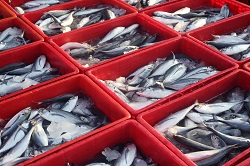New blueprints for managing Europe’s fisheries
The EU’s Common Fisheries Policy pledges to provide EU citizens with a long term, sustainable, secure and healthy food supply. But managing Europe’s fisheries is a complex task that must meet the challenge of making fishing environmentally, economically and socially sustainable. One EU project – MYFISH (Maximising Yield of Fisheries while Balancing Ecosystem, Economic and Social Concerns) – has helped tackle this challenge by defining the required measurements and setting out plans that can be used in effectively managing Europe’s fisheries. The project worked on the concept of the Maximum Sustainable Yield (MSY) of fisheries which has been used to manage fisheries for 50 years. MSY refers to the largest average catch that can be captured from a fish stock under existing environmental conditions. MYFISH addressed the lack of agreement on the terms ‘sustainable’ and ‘yield’. It also tackled concerns on how achieving a sustainable approach - or MSY - for one stock, may affect other stocks and the broader socio-economic and ecological system. New MSY indicators The project has developed new MSY indicators that can ensure high levels of fishery yield whilst respecting ecological, economic and social sustainability. These indicators subsequently inform its new multiannual implementation plans. MYFISH has also created new user-friendly guides to help fisheries stakeholders make decisions on how much fish can be caught whilst taking economic, ecological and social aspects into account. The new indicators were defined with the involvement of a wide range of stakeholders from across industry. MSY now encompasses both maximum economic yield and sustainability criteria, such as the desire to maintain and preserve sensitive species, as well as support employment. In particular, MYFISH found that the principle of MSY can be expanded from an approach focussed on just one species of fish, to multiple interacting species and fisheries. Meanwhile, the project concluded that management strategies focusing purely on boosting yield when they might compromise ecosystem or social sustainability should be avoided. MYFISH also argues that the implementation of management plans must be flexible. Variations in ecosystems and in economic and social aspects must be taken into account. So too must the specific characteristics of individual fisheries. Moreover, management plans need to outline choices and explain the trade-offs in a way that is easily understandable to users. Plans should ideally allow users to experiment with different choices, the project said. One other finding of the project was that decreasing fishing pressures for spawning fish stocks would increase catches and income. MYFISH concentrated on the five main areas for European fisheries: the North Sea, the Baltic Sea, the Mediterranean Sea, western waters (Celtic Sea, Irish Sea, Bay of Biscay and Iberian Sea) and widely ranging fish. Next steps With the end of the project in February 2016, the MYFISH consortium has noted that further work will be needed to further develop different MSY ranges. In particular, the project advocates more consideration over creating the concept of a Pretty Good Yield (PGY). PGY is defined as sustainable yield of at least 80 % of the maximum sustainable yield. Such yields are generally obtained over a broad range of stock sizes (20-50 % of unfished stock abundance), and this range is not sensitive to the population's basic life history parameters, such as natural mortality rate, somatic growth rate, or age at maturity. MYFISH received nearly EUR 5 000 000 of EU funding. For more information please see: MYFISH project website
Countries
Denmark



